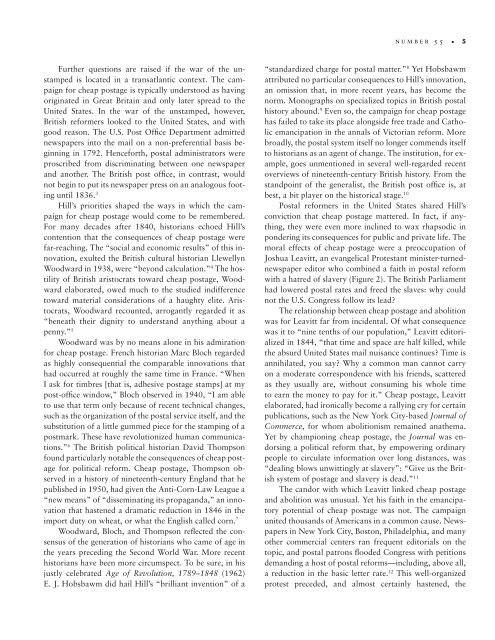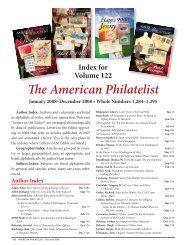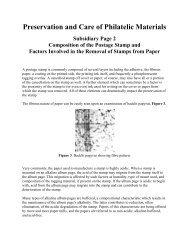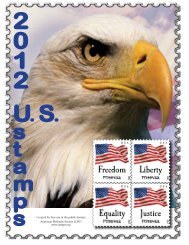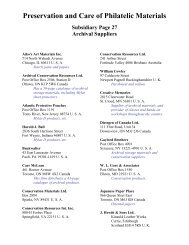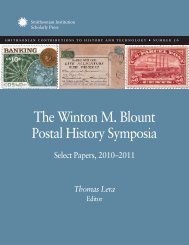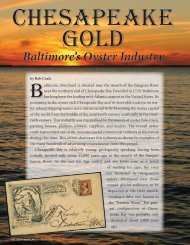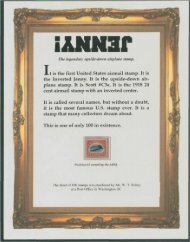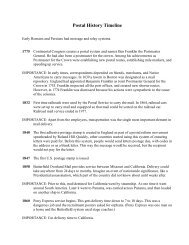The Winton M. Blount Postal History Symposia - Smithsonian ...
The Winton M. Blount Postal History Symposia - Smithsonian ...
The Winton M. Blount Postal History Symposia - Smithsonian ...
- No tags were found...
Create successful ePaper yourself
Turn your PDF publications into a flip-book with our unique Google optimized e-Paper software.
n u m b e r 5 5 • 5Further questions are raised if the war of the unstampedis located in a transatlantic context. <strong>The</strong> campaignfor cheap postage is typically understood as havingoriginated in Great Britain and only later spread to theUnited States. In the war of the unstamped, however,British reformers looked to the United States, and withgood reason. <strong>The</strong> U.S. Post Office Department admittednewspapers into the mail on a non- preferential basis beginningin 1792. Henceforth, postal administrators wereproscribed from discriminating between one newspaperand another. <strong>The</strong> British post office, in contrast, wouldnot begin to put its newspaper press on an analogous footinguntil 1836. 3Hill’s priorities shaped the ways in which the campaignfor cheap postage would come to be remembered.For many decades after 1840, historians echoed Hill’scontention that the consequences of cheap postage werefar- reaching. <strong>The</strong> “social and economic results” of this innovation,exulted the British cultural historian LlewellynWoodward in 1938, were “beyond calculation.” 4 <strong>The</strong> hostilityof British aristocrats toward cheap postage, Woodwardelaborated, owed much to the studied indifferencetoward material considerations of a haughty elite. Aristocrats,Woodward recounted, arrogantly regarded it as“beneath their dignity to understand anything about apenny.” 5Woodward was by no means alone in his admirationfor cheap postage. French historian Marc Bloch regardedas highly consequential the comparable innovations thathad occurred at roughly the same time in France. “WhenI ask for timbres [that is, adhesive postage stamps] at mypost- office window,” Bloch observed in 1940, “I am ableto use that term only because of recent technical changes,such as the organization of the postal service itself, and thesubstitution of a little gummed piece for the stamping of apostmark. <strong>The</strong>se have revolutionized human communications.”6 <strong>The</strong> British political historian David Thompsonfound particularly notable the consequences of cheap postagefor political reform. Cheap postage, Thompson observedin a history of nineteenth- century England that hepublished in 1950, had given the Anti- Corn- Law League a“new means” of “disseminating its propaganda,” an innovationthat hastened a dramatic reduction in 1846 in theimport duty on wheat, or what the English called corn. 7Woodward, Bloch, and Thompson reflected the consensusof the generation of historians who came of age inthe years preceding the Second World War. More recenthistorians have been more circumspect. To be sure, in hisjustly celebrated Age of Revolution, 1789–1848 (1962)E. J. Hobsbawm did hail Hill’s “brilliant invention” of a“standardized charge for postal matter.” 8 Yet Hobsbawmattributed no particular consequences to Hill’s innovation,an omission that, in more recent years, has become thenorm. Monographs on specialized topics in British postalhistory abound. 9 Even so, the campaign for cheap postagehas failed to take its place alongside free trade and Catholicemancipation in the annals of Victorian reform. Morebroadly, the postal system itself no longer commends itselfto historians as an agent of change. <strong>The</strong> institution, for example,goes unmentioned in several well- regarded recentoverviews of nineteenth- century British history. From thestandpoint of the generalist, the British post office is, atbest, a bit player on the historical stage. 10<strong>Postal</strong> reformers in the United States shared Hill’sconviction that cheap postage mattered. In fact, if anything,they were even more inclined to wax rhapsodic inpondering its consequences for public and private life. <strong>The</strong>moral effects of cheap postage were a preoccupation ofJoshua Leavitt, an evangelical Protestant minister- turnednewspapereditor who combined a faith in postal reformwith a hatred of slavery (Figure 2). <strong>The</strong> British Parliamenthad lowered postal rates and freed the slaves: why couldnot the U.S. Congress follow its lead?<strong>The</strong> relationship between cheap postage and abolitionwas for Leavitt far from incidental. Of what consequencewas it to “nine tenths of our population,” Leavitt editorializedin 1844, “that time and space are half killed, whilethe absurd United States mail nuisance continues? Time isannihilated, you say? Why a common man cannot carryon a moderate correspondence with his friends, scatteredas they usually are, without consuming his whole timeto earn the money to pay for it.” Cheap postage, Leavittelaborated, had ironically become a rallying cry for certainpublications, such as the New York City- based Journal ofCommerce, for whom abolitionism remained anathema.Yet by championing cheap postage, the Journal was endorsinga political reform that, by empowering ordinarypeople to circulate information over long distances, was“dealing blows unwittingly at slavery”: “Give us the Britishsystem of postage and slavery is dead.” 11<strong>The</strong> candor with which Leavitt linked cheap postageand abolition was unusual. Yet his faith in the emancipatorypotential of cheap postage was not. <strong>The</strong> campaignunited thousands of Americans in a common cause. Newspapersin New York City, Boston, Philadelphia, and manyother commercial centers ran frequent editorials on thetopic, and postal patrons flooded Congress with petitionsdemanding a host of postal reforms—including, above all,a reduction in the basic letter rate. 12 This well- organizedprotest preceded, and almost certainly hastened, the


